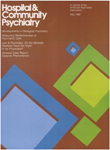Measuring Restrictiveness of Psychiatric Care
Abstract
"Restrictiveness" is neither a narrow legal concept nor a clinical concept that encompasses all aspects of a patient and his treatment; it refers to several features of treatment that can infringe on individual freedoms. As part of a study to develop a reliable method to measure restrictiveness, 31 mental health professionals were asked to rate the restrictiveness of six dimensions of treatment, such as legal status, and 33 treatment alternatives. Interrater reliability was high for both the importance of dimensions (alpha = .92) and the restrictiveness of alternatives within dimensions (alpha = .99). The treatment dimension judged most important in assessing restrictiveness was "limitations of physical freedom." The scale resulting from these judgments offers a plausible measurement of the restrictiveness of treatment configurations for use in evaluation research. The authors caution that restrictiveness is not in itself a comprehensive index of the quality of psychiatric care.
Access content
To read the fulltext, please use one of the options below to sign in or purchase access.- Personal login
- Institutional Login
- Sign in via OpenAthens
- Register for access
-
Please login/register if you wish to pair your device and check access availability.
Not a subscriber?
PsychiatryOnline subscription options offer access to the DSM-5 library, books, journals, CME, and patient resources. This all-in-one virtual library provides psychiatrists and mental health professionals with key resources for diagnosis, treatment, research, and professional development.
Need more help? PsychiatryOnline Customer Service may be reached by emailing [email protected] or by calling 800-368-5777 (in the U.S.) or 703-907-7322 (outside the U.S.).



